 W
W"All This Time Still Falling Out of Love" is a song by British synthpop duo Erasure. The track appears on the band's eleventh studio album Nightbird and Mute Records released it together with "Here I Go Impossible Again" as a double A-side, the third single release from this album.
 W
W"Always" is a synthpop ballad by British duo Erasure. It was released in 1994 as the first single from their sixth studio album, I Say I Say I Say. Written by Erasure members Vince Clarke and Andy Bell, it was produced by Martyn Ware. Mute Records issued the single in the United Kingdom, and Elektra Records released it in the United States.
 W
W"Blue Savannah" is a song by Erasure which was issued as a single from the duo's fourth studio album, Wild! in 1990. It is a classic Erasure synthpop song written by members Vince Clarke and Andy Bell. Mute Records released it in Europe as the album's third single, and Sire Records released it in the United States as the album's second single. Considered one of the band's signature songs, the duo still perform it regularly in concerts. Been described as an uplifting love song, the instrumentation is crisp and heavily synthesized, accented with sweeping, programmed piano.
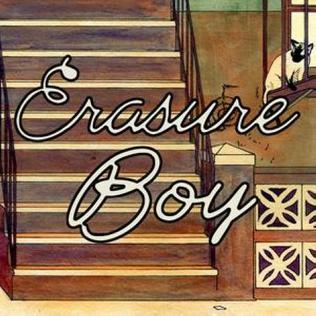 W
W"Boy" is a ballad performed by British duo Erasure. Originally recorded in typical synthpop/Erasure style in 1997, the song appeared on their album Cowboy. In 2006, Erasure members Vince Clarke and Andy Bell released Union Street, an album containing past Erasure songs reinterpreted in acoustic and country and western style.
 W
W"Breath of Life" is a 1992 song by English synth-pop duo Erasure, released as the fourth and final single from their fifth studio album, Chorus. It was written by Erasure members Vince Clarke and Andy Bell with additional input from Pat O'Brien. The lyrics are from the point of view of someone who is beginning to experience life on his own terms, finding love and making decisions without the control of outside influences. Been described as an uptempo synthpop song, its dance music elements were strongly accentuated for the club remixes. For the single release, it was remixed slightly, including a shortened intro. In the United States, it was the third single released from the album.
 W
W"Breathe" is a song by British synthpop duo Erasure. It was released by Mute Records in the UK and the U.S. as the first single from the band's eleventh studio album Nightbird.
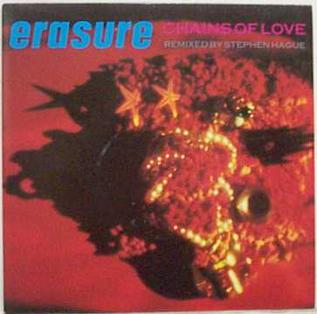 W
W"Chains of Love" is a song by British synthpop duo Erasure, released in May 1988 as their ninth single overall. Written by Vince Clarke and Andy Bell, it is an uptempo dance-oriented synthpop track with Clarke's signature analogue sound and Bell's lyrics about breaking through any restrictions or stereotypes of what love should be. The lyrics allude subtly to Bell's desire for wider acceptance of gay couples, his pain evident from the opening lines "How can I explain when there are few words I can choose/How can I explain when words get broken". The chorus is memorable for Bell's use of falsetto. The song was released by Mute Records as the second single from Erasure's third studio album The Innocents. In the United States, Sire Records released it as the first single. The album version was produced by Stephen Hague and was slightly remixed for its single release. The accompanying music video featured Clarke and Bell performing the song while being hoisted through the air by thick, metal chains.
 W
W"Chorus" is a 1991 song by English synth-pop duo Erasure. It is the title track and first single from their fifth studio album by the same name. Produced by Martyn Phillips and written by Erasure members Vince Clarke and Andy Bell, it is an uptempo synthpop song featuring Clarke's electronic soundscapes and Phillips' computerized production. The single was released by Mute Records in the UK and Sire Records in the US.
 W
W"The Circus" is a song by British synthpop duo Erasure, released in September 1987 as the band's seventh single overall. It is also the title track on their second album, The Circus. Written by Erasure members Vince Clarke and Andy Bell, the song was a departure from the shiny pop of their six previous singles, creating a more down-tempo and melancholy mood. Essentially a synthpop track, the music is accentuated by acoustic guitar and a continuous circus-like accordion. The lyrics touch on social issues, rare for the duo, and centre on the lament of "working men", whose bright futures and job securities are left shattered in the modern world of greedy corporations and technology. The song's distinctive and unusual sound is said to have been inspired by Bell hearing a record being played backwards. The album version clocks at 5.30 minutes, so it was remixed for single release to a much more radio-friendly 3:50 minutes. Mute Records issued it as the fourth and final single from the album. Despite its haunting quality and dark lyrical content, "The Circus" became Erasure's third UK Top 10 hit, peaking at number six.
 W
W"Don't Say You Love Me" is a song written, produced and performed by Erasure. The track was released by Mute Records as the second single from the duo's eleventh studio album Nightbird. Although essentially a synthpop song, "Don't Say You Love Me" had elements of doo-wop and girl group influences in its rhythm and lyrical structure. The song was remixed twice by Jeremy Wheatley when released as a single, one which gave the song a smoother, more electronic music feel and one which was a harsher dance number.
 W
W"Don't Say Your Love Is Killing Me" is a song by synthpop duo Erasure. It was released as the second single from their eighth studio album Cowboy. The track is an uptempo dance music song written by Vince Clarke and Andy Bell. Mute Records issued the single in the UK.
 W
W"Drama!" is the first single released in September 1989 by Erasure from their fourth studio album Wild!. Written by Vince Clarke and Andy Bell, the synthpop song begins with a low-key keyboard line and a subdued vocal from Bell. As the song progresses, the instrumentation and vocals become more hectic, ultimately ending as a full-blown dance track. "Drama!" contains a "Guilty!" exclamation throughout, provided by Scottish band The Jesus and Mary Chain, who were recording in the studio next door. It has been acknowledged to influence indie music throughout the 90’s and 20’s including Oasis, Arctic Monkeys and New Order. It is also Simon Davolls’ favourite song of 1989.
 W
WThe Violet Flame is the 16th studio album by English synthpop duo Erasure. The album was released through Mute Records on 22 September 2014 in the UK, and 23 September 2014 in North America.
 W
W"Fill Us with Fire" is a single by English synthpop duo Erasure, released as the third single from their 2011 album Tomorrow's World. The song was written by Andy Bell and Vince Clarke, whilst it was produced by electropop musician Frankmusik who produced the rest of the Tomorrow's World album. The B-side "Shot to the Heart" was also written by the duo, but produced by Clarke. This was the final single from Tomorrow's World in all territories except Germany, where "A Whole Lotta Love Run Riot" was released as a download single only.
 W
W"Fingers & Thumbs " is a 1995 song by British synthpop duo Erasure. It originally appeared on the soundtrack to the documentary film Wigstock: the Movie, as "Cold Summer's Day." The duo re-recorded it for their seventh studio album, Erasure with new lyrics. Composed by Vince Clarke and Andy Bell, it is an uptempo dance track. Upon the release, the song became Erasure's twenty-second consecutive Top 20 hit on the UK Singles Chart. In Germany, it stopped at number sixty-nine, while it was a hit on the US Billboard Hot Dance Music/Club Play, peaking at number ten.
 W
W"Freedom" is a song by British synthpop duo Erasure. It was the first single released from Erasure's ninth studio album Loveboat. The track was written by Vince Clarke and Andy Bell. "Freedom" was produced by Flood, and this is the first Flood-produced Erasure single since "The Circus" in 1987.
 W
W"Heavenly Action" is a song by the British synthpop duo Erasure, released in November 1985 as their second single. It is a mid-tempo pop song, written by Erasure members Vince Clarke and Andy Bell as a straightforward ode to love. Issued by Mute Records in the UK and Sire Records in the U.S., the single proved to be the second commercial failure for the duo. The music video for the song was directed by John Scarlett Davies and produced by Nick Verden for Aldabra. It features Clarke and Bell in an outer space/celestial setting, with several young children appearing as angels. To this day, "Heavenly Action" remains Erasure's lowest-charting single on the UK Singles Chart, peaking at number 100. In the United States, "Heavenly Action" was paired with "Who Needs Love Like That" on the 12 inch single and, as a double-sided hit, climbed to number eight on the U.S. Hot Dance Music/Club Play chart. It was later included on the duo's debut album Wonderland, released in June 1986.
 W
W"Here I Go Impossible Again" is a song written and recorded by British synthpop duo Erasure. It appears on the band's eleventh studio album Nightbird and Mute Records released this song together with "All This Time Still Falling Out of Love" as a double A-side, the third single release from this album.
 W
W"I Could Fall in Love with You" is a song recorded by English synthpop duo Erasure. Written by band members Vince Clarke and Andy Bell, the track is the first single released from Erasure's thirteenth studio album Light at the End of the World. Remixes are provided by Jeremy Wheatley and Lee Monteverde, and a James Aparicio mix is available exclusively in the UK iTunes Store. The single contains a non-album B-side titled "I Like It". "I Could Fall in Love with You" was released by Mute Records in the UK on 2 April 2007 and in North America the following day. It was the first Erasure single to be commercially released on 7" vinyl since "Run to the Sun" 13 years previously.
 W
W"I Love Saturday" is a 1994 song by British synthpop duo Erasure, released as the third single from their sixth studio album, I Say I Say I Say. It was written by Vince Clarke and Andy Bell, and produced by Martyn Ware. The single peaked at number twenty on the UK Singles Chart and number twenty on the US Hot Dance Music/Club Play. In Germany, it stopped at number sixty-nine, Erasure's lowest-charting single in that country up to that point. Mute Records issued the single in the UK while Elektra Records released it in the U.S. In addition to the normal vinyl, cassette and CD singles, Mute released the "I Love Saturday EP" in the UK shortly afterwards. It contained several new tracks.
 W
W"In My Arms" is a synthpop ballad by British duo Erasure. Written by Vince Clarke and Andy Bell, the song was released in 1997, as the lead single from their eighth studio album, Cowboy. The album version was released as the single version in both the UK and the US, although the lead synthesizer melody performed during the song's middle eight section was removed for the American version. It was issued by Mute Records in the UK and by Maverick Records in the US. The cover for the US single release was used as an example in the book The 7 Essentials of Graphic Design by Allison Goodman.
 W
W"It Doesn't Have to Be" is a song by British synthpop duo Erasure, released in February 1987. It was issued as a single six weeks before the release of the duo's second album, The Circus. Following the number-two UK placing of previous single "Sometimes", it became Erasure's second Top 20 hit in the UK and their third German Top 20 hit.
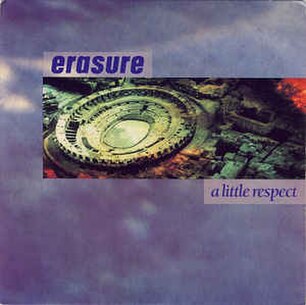 W
W"A Little Respect" is a song written and recorded by the English synth-pop duo Erasure, released in September 1988. It was written by Vince Clarke and Andy Bell. The lyrics are a plea to a lover to show compassion and respect. The heavily synthesized instrumentation is accentuated by acoustic guitar and Bell's vocal falsetto in the chorus. It was their tenth single and was taken from their third studio album, The Innocents. Known as one of their signature songs, the single reached number four on the UK Singles Chart and was Erasure's second consecutive top-20 hit on the US Billboard Hot 100, where it made number 14, and reached number two on the US Hot Dance Club Songs chart.
 W
W"Love to Hate You" is a 1991 song by English synth-pop duo Erasure. It was released as the second single from their fifth studio album, Chorus. Written by band members Vince Clarke and Andy Bell, it is an electronic dance track clearly inspired by disco music. The synthesizer melody in the chorus is an interpolation of the string break from American singer Gloria Gaynor's disco-era classic "I Will Survive". The duo also recorded a Spanish version of the song, called "Amor y Odio", and one in Italian called "Amo Odiarti". The single was released by Mute Records in the UK and Sire Records in the US. It peaked at number four on the UK Singles Chart and became a Top 10 hit in Austria, Denmark, Finland, Greece, Ireland and Sweden.
 W
W"Make Me Smile " is a song by the British rock band Steve Harley & Cockney Rebel, released as the lead single from the band's 1975 album The Best Years of Our Lives. It was written by Harley, and produced by Harley and Alan Parsons. In February 1975, the song reached number-one on the UK chart and received a UK Silver certification. It spent nine weeks in the Top 50, and as of 2015, has sold over 1.5 million copies worldwide.
 W
WMoon & the Sky is a song by synthpop duo Erasure. Originally intended as the second single from their ninth studio album Loveboat, the album cut was remixed drastically for radio play by Jason Creasey and packaged with enough additional tracks and mixes that it could be considered an EP. Mute Records released the single in the UK under the title Moon & the Sky Plus, a similar tactic used for one of Erasure's previous singles ("Rain").
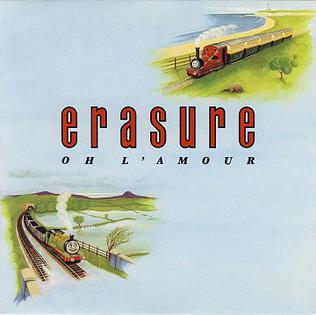 W
W"Oh L'amour" is a song by English synthpop duo Erasure, released in April 1986 as their third single. Written by Erasure members Vince Clarke and Andy Bell, it is a lament from someone experiencing unrequited love ("broke my heart / now I'm aching for you").
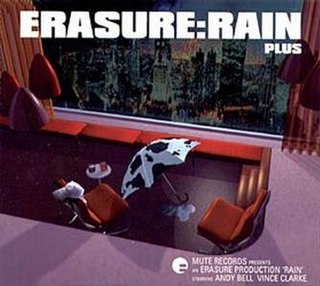 W
W"Rain" is a song by British synthpop duo Erasure. It is the third single from Erasure's eighth studio album, Cowboy (1997). Mute Records distributed the single on CD and vinyl in the UK and Europe. Some releases, titled Rain Plus, had so many remixes and live recordings, that the number of the tracks and their combined running-time made Rain Plus ineligible for ranking on the UK Singles Chart.
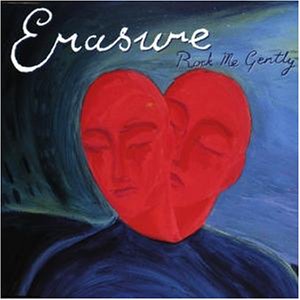 W
W"Rock Me Gently" is a 1996 song by British synthpop duo Erasure. It was written by group members Vince Clarke and Andy Bell, and appears on their seventh studio album, Erasure. Mute Records released it as a single in selected European countries, including Germany and Czech Republic. It was not released in the UK or the US. In its album form, the song is an extended, ten-plus minutes mid-tempo synth ballad with ambient elements and a free-form vocal performance by Diamanda Galás, during the song's breakdown. Bell's lead vocals were accentuated by the London Community Gospel Choir, who sang background. "Rock Me Gently" was drastically[altered for its single release — adding a radio-friendly drum track to the mix and editing out most of the Galás interlude. An extended version of this mix was included on the CD single, retaining the Galás section while keeping the new instrumentation.
 W
W"Run to the Sun" is a 1994 song by British synthpop duo Erasure, released as the second single from their sixth studio album, I Say I Say I Say. It is written by Vince Clarke with fellow Erasure member Andy Bell and is an uptempo dance music track that displays signature synthesizer programming by Clarke. The single peaked at number six on the UK Singles Chart, becoming Erasure's fifteenth UK Top 10 hit. In Germany, it stalled at number forty-nine. In the US, the song reached position twenty-four on the Bubbling Under Hot 100 Singles and number fourteen on the Hot Dance Music/Club Play. The UK 7" single of "Run to the Sun" was issued on yellow-coloured vinyl and featured a fold-out poster of the single's cover artwork. The single's B-side, a ballad entitled "Tenderest Moments", was later re-recorded by Erasure in an acoustic version for their 2006 album Union Street.
 W
W"Ship of Fools" is a song by British duo Erasure, released in 1988 as the lead single from their third studio album The Innocents. It was written by Vince Clarke and Andy Bell, and produced by Stephen Hague and Dave Jacob. The song, which reached number six on the UK Singles Chart, was the duo's eighth single overall and their fourth UK Top 10 single.
 W
WChorus, Erasure's fifth proper studio album, was released on 14 October 1991 by Mute Records in Germany and the UK and on 15 October 1991 by Sire/Reprise Records in the United States. It later made the short list of nominees for the 1992 Mercury Prize. In 1999, Ned Raggett ranked the album at number 45 in his list of "The Top 136 or So Albums of the Nineties".
 W
W"Solsbury Hill" is a song by English musician Peter Gabriel. He wrote the song about a spiritual experience atop Little Solsbury Hill in Somerset, England, after his departure from the progressive rock band Genesis, of which he had been the lead singer since its inception. The song was his debut single. The single was a Top 20 hit in the UK, peaking at number 13, and reached number 68 on the Billboard Hot 100 chart in 1977. The song has often been used in film trailers for romantic comedies.
 W
W"Sometimes" is a song by British synthpop duo Erasure, released in October 1986 as their fourth single overall. Written by band members Vince Clarke and Andy Bell, it typifies the Erasure sound — an uptempo, dance-oriented pop tune accentuated by Clarke's phase distortion and analogue synthesizers and Bell's lyrics about being in love. The trumpet solo is performed by Guy Barker. After three commercial flops from their debut album Wonderland, the single became Erasure's first bona fide hit, peaking at number one in South Africa, number two in their native United Kingdom and in Germany, and becoming a huge international hit. In the US, it became Erasure's second Top 5 hit on the US Billboard Hot Dance Music/Club Play chart, where it charted alongside "It Doesn't Have to Be" and peaked at number four. Peaking only at number 39 in the French Singles Chart, "Sometimes" still remains Erasure's last chart entry in France ever since. The single spent seventeen weeks in the UK singles chart — the duo's longest chart run for a single in that country — and was included on Erasure's second album The Circus, released six months later in March 1987.
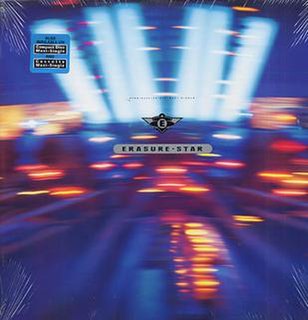 W
W"Star" is a 1990 song by duo Erasure, released as the fourth European single from the group's fourth studio album, Wild!. Been described as a straightforward dance music track with disco elements, it was written by Erasure members Vince Clarke and Andy Bell. The lyrical content clearly referencing nuclear war; Erasure's own form of protest song. When released, the track was remixed slightly for radio, bringing acoustic guitar elements and various background vocal parts forward in the mix.
 W
W"Stay with Me" is a 1995 song by British synthpop duo Erasure, released as the lead single from their self-titled, seventh studio album, Erasure. Written by Vince Clarke and Andy Bell, it is a slow love ballad. Starting with simple synth chords from Clarke and subdued vocal from Bell, the song builds to a mid-tempo gospel-influenced conclusion, complete with vocal contributions from the London Community Gospel Choir. Like the other two singles from this album, it was edited for its release. It was not as successful as prior Erasure singles, reaching number fifteen on the UK Singles Chart, and it did not chart in the United States or Germany. In Sweden, it peaked at number 13. In an interview with John Marshall from Lincs FM in 2009, Bell stated that "Stay With Me" was one of his favourite Erasure songs.
 W
W"Sunday Girl" is a song recorded by the British synthpop duo Erasure. Written by Erasure members Vince Clarke and Andy Bell, it is the opening track on the duo's thirteenth studio album Light at the End of the World. The song was the second UK single released from the album, on 11 June 2007. A North American release followed in July 2007.
 W
W"Take a Chance on Me" is a song by the Swedish pop group ABBA. It was released in January 1978 as the second single from their fifth studio album ABBA: The Album. The song has been featured on a number of ABBA compilations such as Gold: Greatest Hits.
 W
W"Victim of Love" is a song by British synthpop duo Erasure, released in May 1987 as their sixth single overall. It was the third single to be lifted from the duo's second album, The Circus, released six weeks earlier, and was remixed for single release. Written by band members Vince Clarke and Andy Bell, it incorporates the signature Erasure sound of uptempo rhythm, analogue synthesizer and a prominent acoustic guitar. Bell's lyrics pertain to one's apprehension when entering into a new love relationship. The song's protagonist doesn't "want to look like some kind of fool" or become a "victim of love". Upon its release, it became the second UK Top 10 single for Erasure, peaking at number seven. It also hit number one on the US Hot Dance Music/Club Play chart. The song remains one of Erasure's signature tunes and is a concert favourite.
 W
W"When I Start To " is a single by English synthpop duo Erasure, released as the lead single from their 2011 album Tomorrow's World. The song was written by Andy Bell and Vince Clarke, whilst it was produced by electropop musician Frankmusik who produced the rest of the Tomorrow's World album.
 W
W"Who Needs Love Like That" is the debut single released by British synthpop duo Erasure. The song was released in the UK on Mute Records in 1985 as a prelude to their debut album Wonderland. The video was directed by John Scarlett Davies and produced by Nick Verden for Aldabra. While the original 1985 release enjoyed only minor success, the later "Hamburg Mix" version reached the top 10 in both the UK and Ireland.
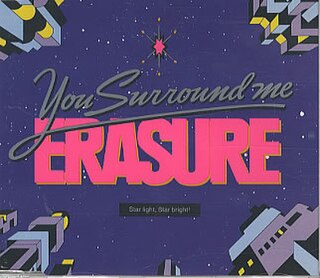 W
W"You Surround Me" is a song by Erasure that was issued in 1989 by Mute Records as the second single from the band's fourth studio album Wild!. Written by Erasure members Vince Clarke and Andy Bell, it is a heavily-synthesized ballad with a dramatic chorus featuring Bell's falsetto. Clarke has stated that this song was his attempt at writing a James Bond film theme. Upon release, "You Surround Me" became Erasure's tenth consecutive Top 20 hit on the UK singles chart, peaking at #15. It reached #10 on the Irish singles chart, and became a Top 40 hit in Germany, where it reached #38. The song was not released as a single in the United States.